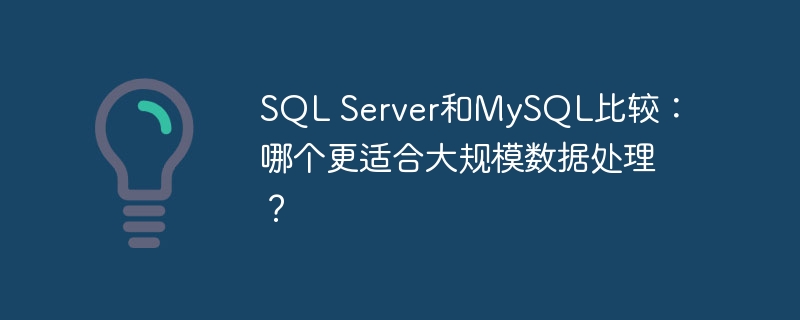

SQL Server and MySQL are currently two very popular relational database management systems (RDBMS). They are both powerful tools for storing and managing large-scale data. However, they have some differences in handling large-scale data. This article will compare SQL Server and MySQL, focusing on their suitability for large-scale data processing.
First of all, let us understand the basic characteristics of SQL Server and MySQL. SQL Server is a commercial database management system developed by Microsoft Corporation and is suitable for Windows operating systems. It has a powerful feature set and extensive support, making it particularly suitable for enterprise-level applications. MySQL is an open source RDBMS developed and maintained by Oracle Corporation and is suitable for multiple operating systems. It is known for its high performance, reliability, and flexibility, and is widely used in web applications and small businesses.
For large-scale data processing, we must consider the performance and scalability of the database. There are some differences between SQL Server and MySQL in this regard. SQL Server is generally considered to be better at handling very large data sets. It has an optimized query execution engine and a highly parallelized architecture that can handle complex queries and high-volume transactions. In addition, SQL Server also provides a partitioned table function, which can divide table data into multiple physical storage partitions to further improve performance.
MySQL also has good performance and scalability, especially when processing small and medium-sized data. It uses a multi-threaded execution model and can handle multiple query requests at the same time. In addition, MySQL's read and write concurrency capabilities have also been greatly improved, allowing it to maintain good response speed under high load conditions. Although MySQL does not have as powerful parallel processing capabilities and partitioned table functions as SQL Server, it can cope with the needs of large-scale data processing through vertical and horizontal expansion.
The following is a simple code example that shows how to use SQL Server and MySQL to perform a simple query:
In SQL Server, we can use the following code to query a simple Table:
--创建一个示例表 CREATE TABLE Students ( Id INT PRIMARY KEY, Name VARCHAR(50), Age INT ); --插入示例数据 INSERT INTO Students (Id, Name, Age) VALUES (1, 'John', 20), (2, 'Sarah', 22), (3, 'Emily', 19); --执行查询 SELECT * FROM Students;
In MySQL, we can use the following code to perform the same query:
--创建一个示例表 CREATE TABLE Students ( Id INT PRIMARY KEY, Name VARCHAR(50), Age INT ); --插入示例数据 INSERT INTO Students (Id, Name, Age) VALUES (1, 'John', 20), (2, 'Sarah', 22), (3, 'Emily', 19); --执行查询 SELECT * FROM Students;
Whether in SQL Server or MySQL, the above code will create a table called Students table and insert some sample data. Then, they execute a simple SELECT statement to retrieve all rows from the table.
To sum up, SQL Server and MySQL are both powerful database management systems suitable for large-scale data processing. SQL Server generally performs better when processing very large data sets, while MySQL performs well when processing small to medium-sized data. Which system you choose depends on your specific needs and environment. No matter which one you choose, it needs to be optimized and adjusted according to the actual situation to achieve the best performance.
The above is the detailed content of SQL Server vs. MySQL comparison: Which one is better for large-scale data processing?. For more information, please follow other related articles on the PHP Chinese website!




